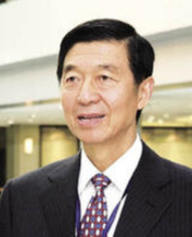| Nourishing as a Fine Spring Rain
 |
|
WU JIANMIN served as Chinese ambassador to the Netherlands and France, China's permanent representative to the UN office in Geneva, president of China Foreign Affairs University (CFAU) and chair of International Exhibition Bureau (BIE). He is now a professor with CFAU. |
By arrangement of the Office of Chinese Language Council International, my wife Shi Yanhua and I visited the U.S. from November 3 to 19, 2010. Our journey took us from the West Coast to the East, visiting en route the University of California at Los Angeles, University of Oklahoma, University of Memphis, University of Chicago and University of Maryland, each one of which has a Confucius Institute. During our visit I spoke on the subject of Global Changes and Sino-U.S. Relations, and my wife's lectures were on the theme ''Agree to Differ.'' Each session finished with questions from the audience. We met many Americans in our 17 days in the country, and came back with lots of thoughts to share with our friends back home.
What impressed me most from the trip is the growing trend of studying Chinese culture and language, a trend that has swept across a country still in the throes of an economic slump and high unemployment.
Susan Pertel Jain, director of the UCLA Confucius Institute, told me she fell in love with Sichuan Opera when she studied in Chongqing in the early 1980s, and had since dedicated herself to research on this stage art. She still teaches classes on the opera today. Susan is optimistic about the future of the Confucius institutes, seeing their potential for teaching Chinese culture as a whole, not just the language. In her university more and more students are taking Chinese courses, which are also finding their way into California high schools. Asked why American students are showing greater interest in Chinese, she said that the rise of China has stirred a desire to learn more about it, and opened up new scope for cooperation between the two countries. Young Americans conversant with Chinese can expect more job opportunities after graduation. What's more, some parents claim that their kids do better in mathematics after learning Chinese!
The UCLA chancellor believes his university's decision to establish a Confucius Institute was a wise one. UCLA maintains close ties with Shanghai Jiaotong University, and the Chinese director of the UCLA Confucius Institute, Zhuang Lailai, is from Shanghai Jiaotong University. Mr. Zhuang believes that both universities benefit from their student and faculty exchange programs and from their academic collaboration.
At an elementary school attached to the University of Memphis we joined a class on Chinese tea culture given in Chinese by a Chinese teacher. Pictures of tea gardens and tea wares were projected, and green tea was made and served to the kids. The pupils, aged six or seven, all looked excited as they took a sip. I dare say most of them would drink coffee at home and this class was a rare opportunity to taste Chinese tea. Before concluding the class the teacher made this inspiring remark: ''Tea tastes a little bitter at first, but the sweet aftertaste soon comes through. This is the same with life. Any achievement is the fruit of hard work. In Chinese we call it 'bitterness prior to sweetness.' '' Sitting among the kids, I thought that one might develop an interest in Chinese language and culture if exposed to such things at a tender age. If the study is continued in later years, one is more likely to get involved in expanding U.S.-China relations someday. Few of these people would feel hostile toward China. There are 70 to 80 Confucius institutes in the U.S. and the significance of their work is immeasurable.
At the University of Chicago I was told the institution is known for its strength in research, and has produced 83 Nobel laureates, so the emphasis of the Confucius Institute there is on China research. The university vice president told me that China is becoming more and more interesting to Americans but they are under-informed about the country. He hopes someday the University of Chicago will be as preeminent in advanced China studies as it is in many other disciplines and that people seeking to understand China would make Chicago's research results their first port of call.
The Confucius Institute of the University of Maryland is headed by Chuan Sheng Liu, former president of Taiwan-based National Central University. He showed me around the school, which is adorned by portraits of the ancient sage and calligraphies of his quotations. Also a professor of physics, Dr. Liu is fascinated by intercultural communications. He told me: ''The U.S. is far from comprehending China. To understand a country, one has to learn its culture.''
When I look back at my 17 days in the U.S., some lines by the Tang poet Du Fu come into my mind: ''A good rain knows when is its right season, comes on the buds of spring; sneaks into the night on the breeze, peacefully brings nourishment to life.'' The setting up of Confucius institutes in the United States is the result of the evolving relationship between China and the rest of the world, against the backdrop of a changing global situation. Commissioned to introduce Chinese culture worldwide, they nourish minds and hearts in the way fine drizzle saturates the soil. The work these schools are doing is promising, sustainable and mutually beneficial.
|
